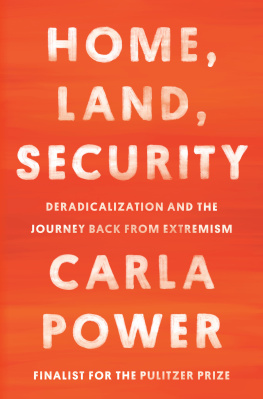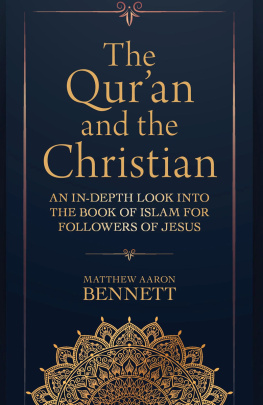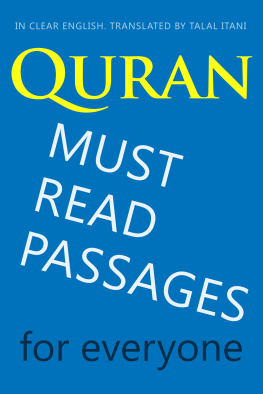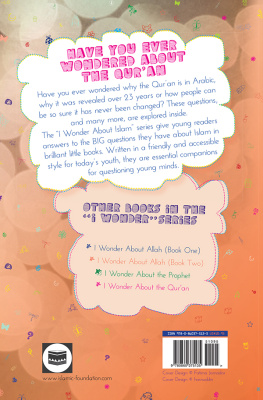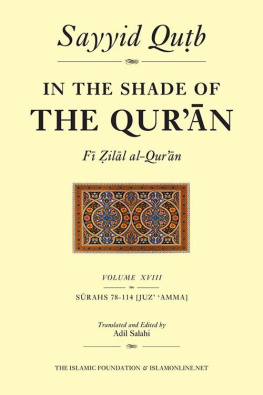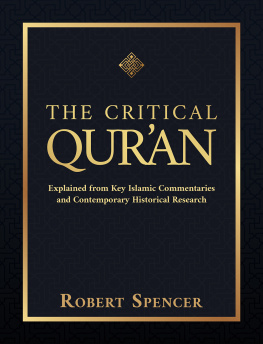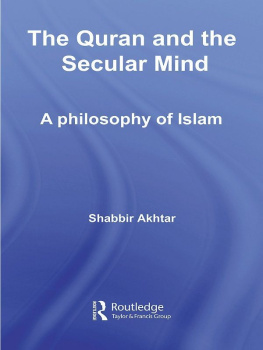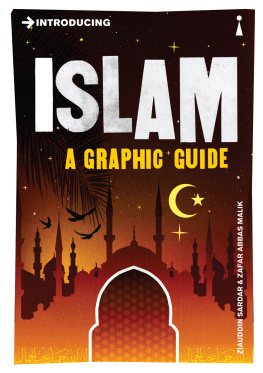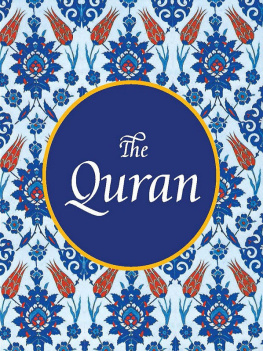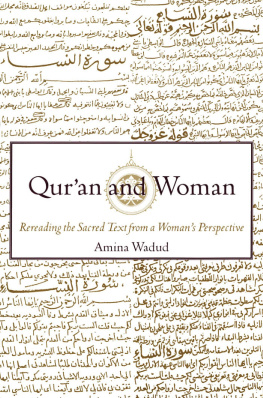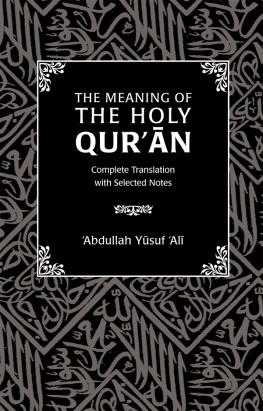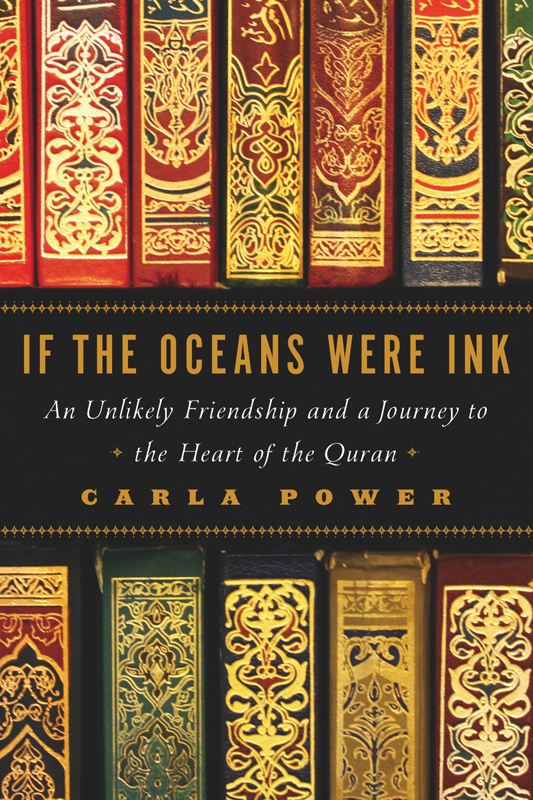Contents
Guide

The author and publisher have provided this e-book to you for your personal use only. You may not make this e-book publicly available in any way. Copyright infringement is against the law. If you believe the copy of this e-book you are reading infringes on the authors copyright, please notify the publisher at: us.macmillanusa.com/piracy.
For Richard and Helen Power, who first showed me the world, and for Antony, Julia, and Nic, who still do, every day.
When I was eleven years old, I bought a tiny book containing a verse from the Quran from a stall outside a Cairo mosque. The amulet was designed to be tucked into a pocket to comfort its owner throughout the day. I was neither Muslim nor literate in Arabic; I bought it not for the words inside but for its dainty proportions. The stalls proprietress watched me bemusedly as I cooed over the matchbox-sized book. My family and I were living in Egypt at the time, and back at home I taped a bit of paper over the cover and crayoned a woman in a long blue dress, writing on top, Jane Eyre by C. Bronte. I then placed the book in the waxy hand of my doll, which sat stiffly on a high shelf in my Cairo bedroom.
The little book outlasted the doll: I found it over a quarter century later, one sticky summer afternoon in St. Louis, wrapped in a jewelry box in my parents house. It was a minor miracle that such a flimsy item from a market stall had endured so long. It was a major miracle that Id found it at all, in a three-story house so crammed with exotic souvenirs that friends called it Aladdins Cave. But somehow I did find that booklet, amid the spoils of my fathers avid collecting from the Middle East and Asia: mosque lamps from Cairo, stacks of Indian brocades and embroideries, Bokhara samovars, lapis lazuli boxes, mounds of tribal jewelry, and hundreds of carpets.
Amid all this, my Quran chapter survived. By the time I found it, I knew enough to be embarrassed for having wrapped someone elses scripture in my own childish concerns. The summer I rediscovered it, during that bleak time after 9/11, shrill voices proclaimed a clash of civilizations between the Islamic world and the West. With suicide bombings in Kabul and Baghdad and the horrors of Abu Ghraib still fresh in my mind, my juvenile game seemed insensitive.
By then, not only had I inherited my fathers immersive interest in the Islamic world, but my childhood fascination had been seasoned by studying and reporting on Muslim societies. Over the years, Id also acquired several more Qurans. As an undergraduate, I bought a $5.99 paperback for a survey course on Islam. It sat on my bookshelf, its pages cheap and grainy, its spine barely cracked. In my twenties, when I was working at an Islamic think tank in Oxford, I received a Quran for free, courtesy of the Saudi Arabian government. Bound in blue leatherette, stamped in gilt with calligraphic script, it was one of millions of copies distributed across the globe in the 1990s as part of an official Saudi campaign. A third Quran was parrot green, with pink flowers on its cover. Inside: a pressed rose, withered jasmine blossoms, and two ticket stubs from the Cairo opera houserelics from a romantic summer studying in Egypt. On my bookshelf alone, there were three translations of the Quran, with as many symbolic meanings: one copy a textbook, another an instrument of state-sponsored propaganda, the third a repository of personal memories.
But my Qurans only hint at the books symbolic possibilities. Since Muslims consider it the word of God, a Quran not only offers comfort and inspiration as a text, but commands reverence as an object. This power has also led to the texts politicization. Waved before a crowd, it can inspire revolutions and wars. Burned or besmirched, it triggers diplomatic incidents and deaths. Quoted or misquoted, its been used to justify mercy, and mass murder. In an age when migration and technology have spread its message far beyond its traditional homelands, the Quran has impressive influence in Europe and America. At times, it has been the target of displays of intolerance. Dutch politicians have tried to ban it. A Florida preacher burned it, streaming the destruction over the Internet. News that American soldiers in Afghanistan had burned several copies of the Quran sparked protests and killings. And when the University of North Carolina put excerpts from it on a summer reading syllabus, right-wing groups launched lawsuits, claiming reading the Quran would interfere with students religious freedom.
The Quran began as a series of revelations to Muhammad, a caravan trader, in the seventh century. In two decades, these words grew into a spiritual, social, and political force in the Arabian Peninsula. Today, the Qurans impact is global. Over fourteen hundred years after the Prophet Muhammad heard the first revelation, the text continues to transform geopolitics as well as personal worldviews. As the scripture of the planets fastest-growing religionwith 1.6 billion followers, Islam is second in global popularity only to Christianityit stands as a moral compass for hundreds of millions. Studied alongside the words and deeds of Muhammad, the Quran has been a bedrock for constitutions, leadership styles, and laws. Its words have lent legitimacy to regimesand to resistance to them. Reading it should be a prerequisite for understanding humanity.
And yet, as Id later discover, surprisingly few people do. Like any rich and complex text, the Quran is invoked more often than read, and read more often than its meanings are agreed upon. Hostile and casual readers have accused the Quran of being chaotic. Even pious Muslims concede that while its majesty and lyricism overwhelm, some verses confuse as much as clarify. In fact, many students of the Quran dont understand the classical Arabic they stumble through, and even top madrasas frequently overlook the book in favor of classical works on Islamic law or philosophy, texts that came into being centuries after the Qurans revelation. Manygood Muslims and curious non-Muslims alikesimply never attempt it. Even the Quran proclaims its own limitless possibilities:
Say, even if the ocean were ink
For (writing) the words of my Lord,
The ocean would be exhausted
Before the words of my Lord were exhausted,
Even if We were to add another ocean to it. (Chapter 18: Verse 109)
Revered by a population as diverse as the umma , or worldwide Muslim community, the Quran can refract in dazzling ways. The San Francisco civil rights lawyer may discover freedoms in the same sura, or chapter, in which a twelfth-century Cairo cleric saw strictures. A Sudanese mullah, or religious teacher, may read a command for wifely obedience; an Indonesian wife may interpret the same passage as a call for equality and compassion. The Marxist and the Wall Street banker, the despot and the democrat, the terrorist and the pluralisteach can point to a passage in support of his cause.
* * *
Sheikh Mohammad Akram Nadwi, the Islamic scholar who taught me the Quran, once told me an old Indian joke. A Hindu goes to his Muslim neighbor and asks if he could borrow a copy of the Quran. Of course, said the Muslim. Weve got plenty! Let me go get you one from my library. A week later, the Hindu returns. Thanks so much, he said. Fascinating. But I wonder, could you give me a copy of the other Quran?
Um, youre holding it there, said the Muslim. Theres just one Quran, and youve got it.
Yeah, I read it, replied the Hindu. But I need a copy of the Quran thats followed by Muslims.


